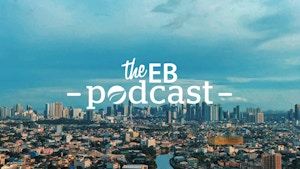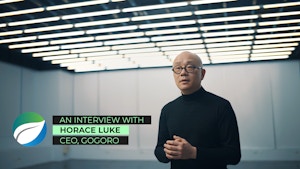Podcast / 城市

The Singapore scientist, recently elected to the UN's top climate body, tells the Eco-Business Podcast about the precarious state of climate adaptation in developing Asia. The region is not well-prepared to manage the cascading risks of extreme climate events, he says.

EB工作室
Covid-19 didn't kill events, but it did change them. Teymoor Nabili and Veemal Gungadin tell the Eco-Business Podcast how a pandemic transformed the way sustainability events are conceived and organised.

GoTo sustainability head Tanah Sullivan tells the Eco-Business Podcast that regulating net-zero claims would decarbonise Southeast Asia faster. Indonesia's biggest internet firm aims to cut emissions to zero by 2030 — a target critics say is unrealistic.
全部城市 Podcast
22 三月 2022
18 十一月 2021
30 十月 2020
14 十月 2020
20 九月 2020
26 八月 2020
20 三月 2019
27 二月 2019
2 五月 2018
10 一月 2018
最多人阅读
-
![Gibran Rakabuming Raka, the 36-year-old son of President Joko Widodo]() As Indonesia heads for the polls, Eco-Business assess which of the three major presidential candidates has the strongest …
As Indonesia heads for the polls, Eco-Business assess which of the three major presidential candidates has the strongest … -
![CDP business card with leafy backdrop]() 独家 Of 52 global roles created by the climate disclosure non-profit, none are in Asia – despite it previously …
独家 Of 52 global roles created by the climate disclosure non-profit, none are in Asia – despite it previously … -
![Kuamut forest reserve sabah]() The Malaysian carbon exchange also plans to offer renewable energy certificates for trade on its platform and accept …
The Malaysian carbon exchange also plans to offer renewable energy certificates for trade on its platform and accept … -
![Bangkok city]() EB工作室 In the wake of the world’s first Article 6 transaction between Thailand and Switzerland, Asia may hold the …
EB工作室 In the wake of the world’s first Article 6 transaction between Thailand and Switzerland, Asia may hold the … -
![Ho Xiang Tian delivering a speech at a climate rally in Singapore in September 2023.]() The Sustainability Leadership A-List Youth winner tells Eco-Business about the Singapore he wants to see: a carbon-neutral decarbonisation …
The Sustainability Leadership A-List Youth winner tells Eco-Business about the Singapore he wants to see: a carbon-neutral decarbonisation … -
![Pan Brothers factory]()
新闻 / 碳与气候
Pan Brothers is first Indonesian manufacturing firm to get net zero targets approved by SBTi
The textiles and garments company, which supplies global brands such as Adidas, Uniqlo and North Face, is only …

































